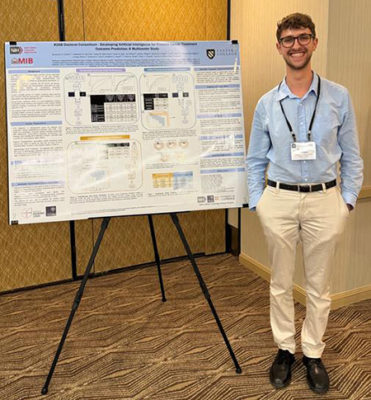Exeter College DPhil Student wins RSNA Trainee Research Prize
Benjamin Simon (2023, Biomedical Sciences), an Exeter College DPhil student within the National Institutes of Health (NIH) Oxford-Cambridge Scholars Program, has won this year’s Radiology Society of North America (RSNA) Trainee Research Prize in Radiation Oncology.
The NIH Oxford-Cambridge Scholars Program is a highly individualised and accelerated doctoral training programme for outstanding students committed to biomedical research careers. The programme aims to bridge two labs to create an interdisciplinary and international doctoral project.
Benjamin has been working in the Computational Health Informatics Lab under the mentorship of Professor David Clifton and the National Cancer Institute at the NIH under the mentorship of Dr Baris Turkbey. His project focuses on building multimodal AI models to predict treatment outcomes for prostate cancer patients. Currently treatment for prostate cancer patients is not always individualised, especially when making the decision to treat with surgery or radiation therapy, and often patients are encouraged to decide based on side effects even though there may be features of disease that could make one treatment more suitable for a specific patient. By using AI to contribute to a precision medicine approach, Benjamin has created two preliminary models to predict outcomes for surgical patients and radiation therapy patients with prostate cancer in a single centre cohort and found the models were fairly successful but there is still a lot to do.
The RSNA’s annual meeting is one of the world’s largest radiology forums, helping to boost radiologists’ knowledge with high-impact educational courses and cultivate conversations about the future of medical imaging. Within the RSNA, the Trainee Research Prize recognises residents, fellows, medical students or physics trainees for the best papers or scientific posters presented in each subspecialty. Benjamin chose to submit his work on AI for radiation therapy outcomes and was chosen to give a podium talk about his topic at the conference. He also received the news that he had been awarded the Trainee Research Prize for Radiation Oncology, bringing with it a $1000 monetary award.
Benjamin says “I never expected to win an award like this so early in my DPhil as I have become hyper-aware of my current models’ shortcomings and thought about what I would like to do to improve them in so much depth. This award means a lot to me as it can be hard as a first year DPhil candidate to know if there is value in your work and if others will see it. It’s exciting to validate that other physicians see potential for my work. There is a lot left for me to do as I expand my DPhil work, and I hope we can use these models to improve prostate cancer outcomes and save lives in the future.”
Exeter College warmly congratulates Benjamin for his award-winning project.

